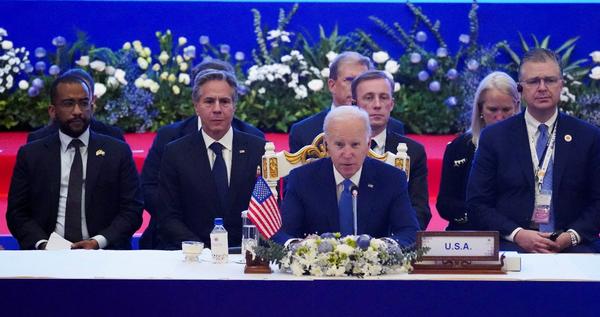A new Task Force on U.S.-China Policy report, Prioritizing Southeast Asia in American China Policy, lays out reasons why Southeast Asia is a critically important but under-appreciated region when it comes to U.S. interests and U.S. competition with China, and recommends actions for the U.S. government, in the face of China’s growing influence in the region.
Southeast Asia has, in recent decades, become an engine of growth for the global economy, with a combined GDP among its 11 nations of more than $3.6 trillion. Much of the world’s trade moves through Southeast Asia’s strategically important waters – the South China Sea and the Malacca Strait.
China is now the region’s top trading partner and one of its top investors. While many Southeast Asians view their region’s economic relationship with China favorably, concern is growing about how China uses its economic clout for political leverage and strategic positioning, sometimes at the expense of Southeast Asian interests. In response, Southeast Asians are increasingly seeking ways to counterbalance China’s growing influence in the region.

The report explains why there is room, and good reason, for the United States to strengthen its already considerable economic, political, and strategic ties with the region. It includes perspectives shared by Southeast Asian policy experts from each of the 10 Association of Southeast Asian Nations (ASEAN) countries, in two days of closed-door dialogue with the Task Force on U.S.-China Policy’s Working Group on Southeast Asia, hosted by the ISEAS-Yusof Ishak Institute in Singapore in May 2023, under the Chatham House Rule.
The Task Force on U.S.-China Policy is co-chaired by Asia Society Vice President and Arthur Ross Director of the Center on U.S.-China Relations Orville Schell, and by Susan Shirk, the founding chair of the University of California, San Diego’s 21st Century China Center.
The report gives recommendations for U.S. policy both from the perspective of the Working Group’s Southeast Asian dialogue partners, and from the Working Group itself.
Southeast Asian recommendations include:
- Be consistent in the U.S. approach to the region. Episodic, inconsistent and self-serving governmental engagement has been America’s greatest failing and weakness, leading to a perception that the U.S. may not be a reliable long-term partner.
- Forget about American “primacy.” The region is now genuinely multipolar. America is only one of several regional actors.
- Get in the regional economic game. Joining regional economic organizations is imperative. If you can’t join CPTPP or RCEP, give serious thought to negotiating a regional U.S.-ASEAN foreign trade agreement.
- Significantly improve U.S. diplomacy, and public diplomacy. Show Southeast Asians that they matter to the United States, and get better at telling what the U.S. is already doing to help them.
- Take ASEAN seriously as an organization. Increase U.S. Mission to ASEAN staff and develop ASEAN-wide initiatives, rather than merely pursuing bilateral relationships.
The Working Group’s recommendations include:
- Resist viewing the region only or mostly through the lens of competition with China
- Increase top-level U.S. governmental visits to Southeast Asia
- Strengthen U.S. embassy capacities throughout the region
- Create a Regional Development Initiative that offers aid and other assistance to improve public health, food and water security, environmental sustainability, and more.
- Increase U.S. public diplomacy, and strengthen U.S. soft power and influence
- Upgrade diplomatic relations and interactions with ASEAN
- Play to American strengths in commerce, with U.S. as part of the regional economic architecture
- Strengthen US intelligence and counter-intelligence cooperation with Southeast Asian counterparts
Continue the full range of in-country military/security assistance programs
The Working Group on Southeast Asia was led by David Shambaugh, Gaston Sigur Professor of Asian Studies, Political Science & International Affairs and Director, China Policy Program, George Washington University, who was also the report’s lead author.
Other Working Group members were:
Orville Schell, Vice-President and Arthur Ross Director, Center on US-China Relations, Asia Society
Daniel Russel, Vice-President for International Security and Diplomacy, Asia Society Policy Institute, and former Assistant U.S. Secretary of State for East Asian and Pacific Affairs (2013–2017)
Ambassador Charlene Barshefsky, Chair, Parkside Global Advisors & former U.S. Trade Representative (1997–2001)
Professor Steven F. Jackson, Fellow, Woodrow Wilson International Center for Scholars
Mary Kay Magistad, Deputy Director, Center on US-China Relations, Asia Society, and former NPR Southeast Asia correspondent
Zack Cooper, Senior Fellow, American Enterprise Institute
Gen. (Rtd.), Karl W. Eikenberry, former U.S. Ambassador to Afghanistan (2009–2011).
To connect with any of the speakers directly for an interview, please reach out to pr@asiasociety.org.
